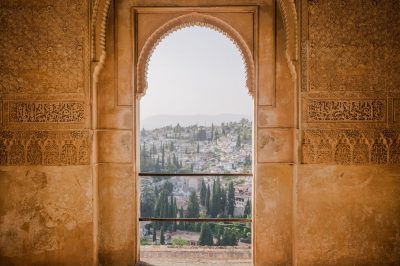During the time of the Prophet Muhammad (peace be upon him), Muslims found themselves cast out of civilization and forced to seek shelter in a mountain hideout near Makkah.
Thus far, their only opposition had been from men, but now they found themselves unsupported by nature too. They survived harsh conditions for three years, using all their skill, might, and willpower to survive.
Khadijah, the wife of the Prophet Muhammad, was someone who had tasted immense luxury and comfort. Yet when faced with this extremely trying circumstance, not only did she adapt gracefully but she used her wealth to provide what she could for her fellow Muslims.
The people either lived in hunger or satisfied themselves and their children with leaves and the bark of trees. They withstood the harsh desert conditions throughout the entire period. When it was over, they were still Muslims – holding firm to their beliefs.
How does one explain that?
In another account, we hear of Abu Bakr As-Siddeeq continuing his generosity towards the man who slandered his daughter Aisha and who brought stress and discomfort into the house of the Prophet Muhammad, peace be upon him.
Where one would expect a father to speak out for his daughter and make excuses on her behalf, we find Abu Bakr relegating the matter to be dealt by the Prophet Muhammad.
How could that possibly be?
Fast forward to the current period that we’re living in and you’ll find more of such incidents which seemingly go against common rationale.
You’ll find the Muslim brother out on the streets of Makkah, serving free dates to drivers in the middle of traffic. You’ll find the Muslim sister being gentle towards her hot-tempered husband and calmly tolerating his discrepancies although Islam has bestowed on her the right to seek better treatment. You’ll find the lender being lenient towards the debtor over an extended period of time, and the trader being generous with his wares and serving above measure.
Whether with the early Muslims or the current generation, what could be the motivation for them to submit themselves in such a manner?
What is Motivation?
The simplest definition of the word ‘motivation’ is ‘that which drives us to action’. It may be one or more intrinsic and extrinsic factors that trigger a desire or need to behave in a certain way. The desire is usually coupled with a potential consequence – either reward or punishment.
Motivation is a concept applied across all ages and all environments; from homes to classrooms, from offices to public life. It allows those in authority to exercise expectations without force and for those under authority to concede without much effort.
Some contemporary theories of motivation state that behavior is motivated by natural instincts such as love, attachment, fear, or anger. Some say that we are motivated by external rewards for behaving in a certain way or by the need to fulfill internal desires. And some theories combine natural instincts, internal desires, and external rewards to describe human behavior.
As human beings, we are drawn to questions such as, “What’s the point of this?” or “Why am I here?” whenever we attempt something and, particularly, when we find it to be difficult. We want work to be meaningful in the long run, want to feel we are doing something worthwhile, and we want to feel validated.
We apply this need not just to day-to-day work but to life itself. At some point, any individual is bound to ask, “Why?”
Allah Almighty has already answered this question for us:
{And I have not created the jinn and the men except that they should serve Me.} (51:56)
Once the purpose of life has been established in our minds, what motivates us to fulfill that purpose?
What is there to lose in not meeting that purpose, or meeting it without vigor?
The Quran tells us:
{By time; indeed, mankind is in loss; except for those who have believed and done righteous deeds and advised each other to truth and advised each other to patience.} (103)
{Whoever does righteousness, whether male or female, while he is a believer – We will surely cause him to live a good life, and We will surely give them their reward [in the Hereafter] according to the best of what they used to do.} (16:97)
The intention here is not to belittle the depth of meaning in every verse of the Quran. However, at face value, they should serve as a reminder to jerk one back, to pause, and to reflect more deeply.
The hope for reward pushes us to obtain the best possible life in the hereafter by using the currency that we have been provided with; i.e. time. A true believer is motivated by the desire for internal satisfaction while also keeping the focus on the ultimate goal – which is to earn Allah’s pleasure.
The Destroyer of Pleasures
What helps us internalize the purpose, rewards, and punishments when we are caught in the nitty gritty details and distractions of life? How do we implement an emotional reset? How do we return to the core when we’re caught wandering about the periphery?
The Prophet Muhammad, peace be upon him, gave us the solution for this by saying:
“Remember more often the destroyer of pleasures – death.” (At-Tirmidhi)
Indeed, remembering the trials surrounding the experience of death knocks us back into a state of true awareness. By “remember” we do not simply mean the act of recalling; we mean internalizing the reality that awaits us and the understanding that our actions will determine the severity or ease of the experience.
Chapters 81 and 82 portray graphic imagery of the end of this world as we know it. Reading and reflecting on these signs would leave one feeling rattled.
Thus, if all else fails, the remembrance of death alone is a sufficient motivator in the life of a believer.
{Every soul will taste death, and you will only be given your [full] compensation on the Day of Resurrection…} (3:185)
The awareness of death and its realities guides one to repent and seek forgiveness for sins consistently. It keeps us humble and in check. It brings with it an amount of wisdom that produces tranquility in the face of hardship, inner contentment with our provisions and blessings, and sweetness in performing acts of worship that go towards fulfilling our purpose in this life and keeping our priorities in order.
By making the du’a, {Our Lord, bring us in the (present) life a fair (reward), and in the Hereafter a fair (reward), and protect us from the torment of the Fire,} (2:201), we strive to attain a perfect balance of enjoying the best of both worlds. We also balance hope and fear while keeping a positive outlook on life.
Keeping the reminder of the bounties that await the good-doer and inevitable transition of death at the forefront of our lives entices us to cultivate good manners, to be remembered as a good person, and to leave something that benefits those that come after us. Thus, the Islamic guidance for motivation is not just to serve human beings at an individual level, but rather mankind as a whole.
(From Discovering Islam archive)



